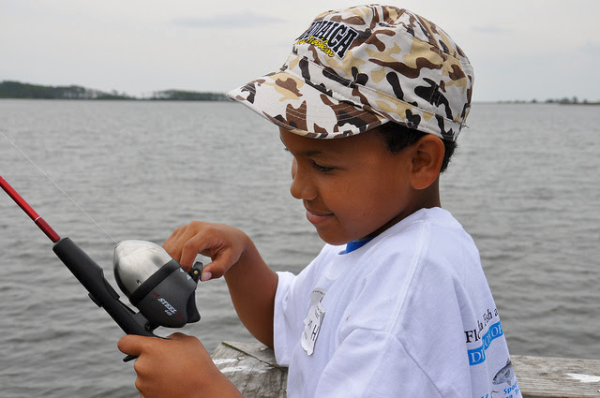
| Take the family fishing From the Maine Division of Inland Fisheries and Wildlife from The Fishing Wire Fishing can be very rewarding and educational for children, especially after they’re been housebound for a long time. Here are some tips for taking them along and introducing them to a sport they might enjoy the rest of their lives. (Of course, everyone needs to practice social distancing from those outside the immediate household during the epidemic, and also hand-washing anytime they touch surfaces outside the home that might be exposed, such as restroom doors and flush handles.) Be relaxed: As you head out the door, leave behind the tension and take along a smile, an open mind, and a lot of patience. Share the Plan: Paint the trip as an adventure. Show the kids where you’re going on a map before you leave the house, and ask them to help navigate.Make it fun: Above all else, make the fishing trip fun and safe. Key to Success: Don’t measure the success of the trip by the number or size of fish caught, but rather by having a fun, safe time outdoors. Be Generous in Praise: Praise the kids for their patience and cooperation. Make it a shore thing: Try giving a child their first few lessons at a local park, farm pond, or a lake with a dock or gentle shoreline where they can run and play when their attention span runs short. Knowing how to fish from shore will allow them to go on their own or with friends when they are old enough. Boating Basics: If and when you progress to a boat, be sure to have the proper safety equipment for you and your youngster. Fish for little fish: Most kids prefer to catch lots of fish versus big fish. Start new anglers off on species that are plentiful and more easily caught, like sunfish or perch. Once the child has developed basic fishing skills, you can move on to larger pursuits. Every fish is a trophy: Little fish, big excitement on your part will make a lifelong angler. Start with the basics: Begin with simple equipment and bait. Use simple spincasting equipment, a bobber, and a hook with live bait, as it will work well for a variety of fish species. And be sure the equipment your child uses is in good working order to avoid any unnecessary frustration. Practice a bit at home: Most kids enjoy learning to cast on their own. Practice, a little at a time with no hooks, in the back yard until they can do it themselves–they’ll enjoy fishing much more. Ask for Input: Where would the kids like to fish? Over by that old tree? Let’s give it a try–sometimes, they discover the best spots themselves, and giving input will make fishing more fun for them. Teach skills: People, regardless of their age, enjoy fishing more when they are in control and can do it themselves. Resist the temptation to do things for your children. If you are using live bait, teach them how to put it on the hook themselves. Teach them how to tie their hook onto their line and how to cast. On future trips, watch their skills, and their confidence, grow. To eat or not to eat: If your children show interest in cleaning and eating the fish, go for it. If they’re catch and release fans, show them how to quickly release the fish to fight again. Save the Moment: Don’t forget to take plenty of photos of that first fish. Post them on social media so the kids can show their friends and the grandparents. Enjoy the outdoors, stay safe and introduce your family to fishing as a respite from these tough times. |